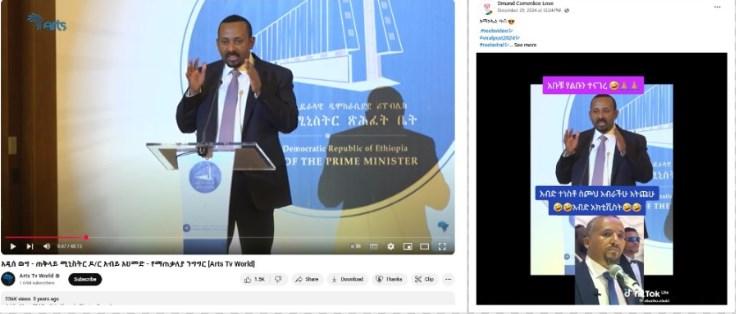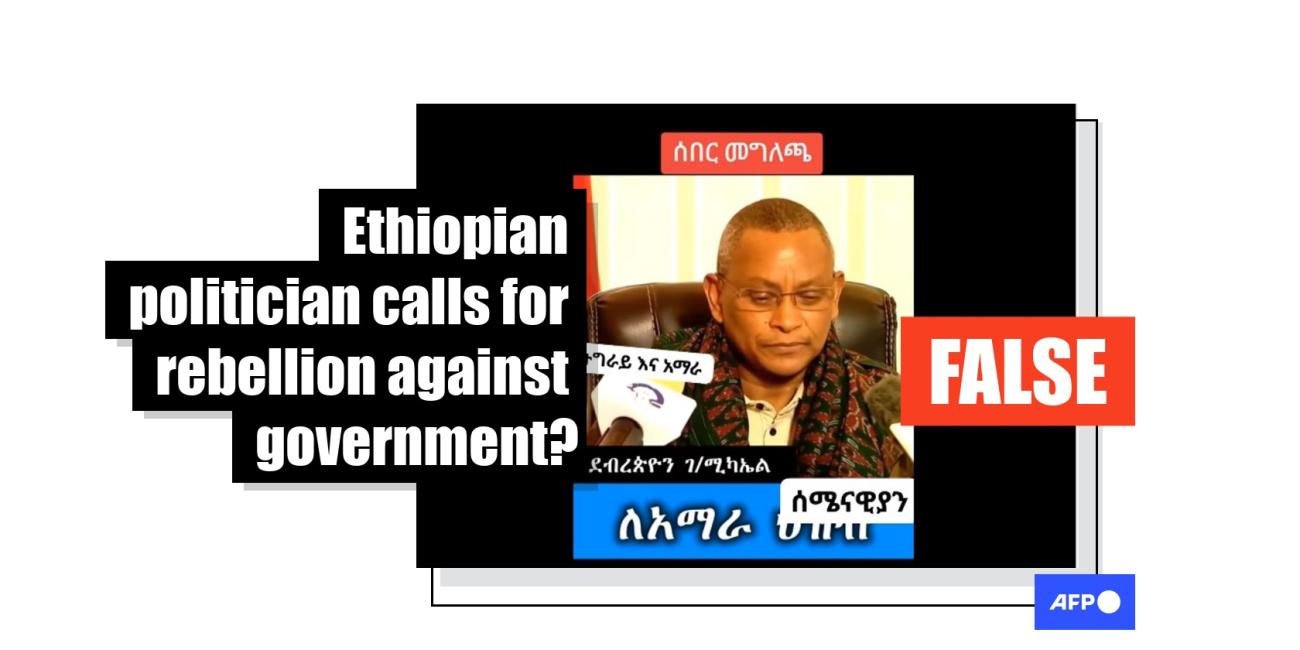
Old speech by Ethiopian PM falsely linked to recent criticism by opposition politician
- This article is more than one year old.
- Published on January 10, 2025 at 16:49
- 4 min read
- By Tolera FIKRU GEMTA, AFP Ethiopia
“Visit Amanuel,” reads an Amharic Facebook post published with a video on December 29, 2024. “Amanuel” refers to a mental health hospital in Addis Ababa, Ethiopia’s capital.

The two-minute clip includes text overlays in Amharic. One reads: “Abichu has spoken the truth.”
Abiy’s supporters like to call him Abichu – a nickname that refers to an Oromo fighter who showed extraordinary bravery during the war against Italy in Ethiopia during the 1890s (archived here).
“Don’t get mad with someone who’s gone crazy, an activist who is a madman,” says another overlay accompanied by laughing emojis.
The slur appears to be directed at Jawar, whose image appears below the text.
Jawar was a political activist before joining the Oromo Federalist Congress in December 2019. Both Abiy and Jawar are Oromo – the largest ethnic group in Ethiopia.
The clip starts with Abiy saying: “It is better not to echo with a madman who aims to disintegrate Ethiopia. Having others shout along with him will mean amplifying the agenda.”
“If sane people can’t stop and ask what’s happening while the insane are disrupting, then everyone will end up in Amanuel,” adds Abiy.
Abiy then talks about individuals who, in his opinion, have extreme political views in Ethiopia.
“Some of them are nostalgic. They still dream of the past regimes and try to understand the present in the past. Others are still trying to understand the present in the future. But, we cannot build a nation without connecting these times in a meaningful way. We cannot completely disregard past historical developments in Ethiopia; we could learn from them,” he says.
“Those of us who were hurt in the past should refrain from distorting the present and the future. This is a disease that many Ethiopian politicians suffer from,” he adds.
The clip was first published on TikTok, where it has been viewed more than 180,000 times.
Jawar’s tour
In January 2022, Jawar was released from prison along with other opposition figures. He served 18 months after being charged with terrorism in connection with clashes that followed the June 2020 shooting of pop star Hachalu Hundessa (archived here).
He left Ethiopia and most recently moved to Kenya’s capital Nairobi, where he finished his memoirs entitled “I Will Not Regret” in Afaan Oromoo and Amharic (archived here).
Since the end of December 2024, Jawar has been promoting his book and meeting with members of the Ethiopian diaspora in various European countries.
His criticism about the political upheavals in Ethiopia have become a major topic of discussion in Ethiopian media.
However, the video does not show Abiy slamming Jawar as a “madman” in response.
Ethiopian democratic trajectory
AFP Fact Check used the video verification tool InVID-WeVerify to conduct reverse image searches on keyframes from the video.
The search results led to Abiy’s original speech published on the YouTube channel of Arts TV, a private broadcaster in Ethiopia, on March 29, 2019 (archived here).
The original video is more than 48 minutes long and the caption reads: “Prime Minister Abiy Ahmed’s concluding remarks at a panel discussion on Ethiopia’s democratic path organised by the Prime Minister’s Office.”
Abiy began his speech by mentioning the purpose of the meeting. “We organised the panel to gather important ideas about our year-long journey and to use it as important input.”
Abiy then spoke about the main challenges confronting Ethiopia’s political development, namely: what he termed irresponsible politicians and activists, a lack of commitment to building a sustainable nation, extremist political views, and non-inclusive ideas.
On extremist views, Abiy said that “there are people who … do not try to appreciate the views of the other side; some groups portray themselves as true Ethiopians and label others as separatists”.
“It is better not to echo with a madman who aims to disintegrate Ethiopia. Having others shout along with him will mean amplifying the agenda,” he added.
Abiy also talked about the rise of activism in Ethiopia. “Many Ethiopian professionals have abandoned their professions to become activists, causing problems.”
The footage used in the misleading clip can be seen from 8’32” to 10’34” in the original video. Both the words and Abiy’s appearance on the screen are exact matches.

Neither in the original video nor the misleading clip did Abiy name any individuals.
Jawar's photo was added to the misleading clip to give the impression that Abiy was hitting back at him following his recent criticisms.
AFP Fact check has previously debunked altered videos related to Ethiopian conflict here, here and here.
Copyright © AFP 2017-2026. Any commercial use of this content requires a subscription. Click here to find out more.
Is there content that you would like AFP to fact-check? Get in touch.
Contact us




